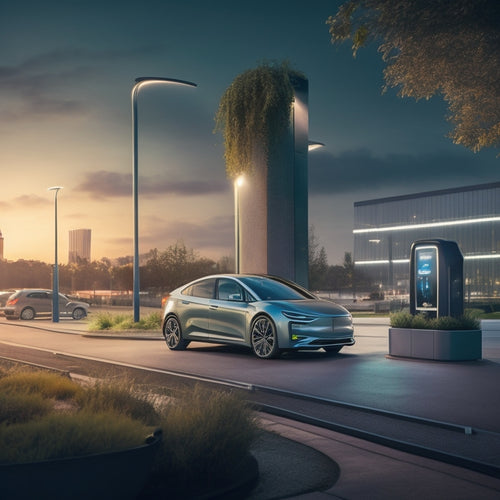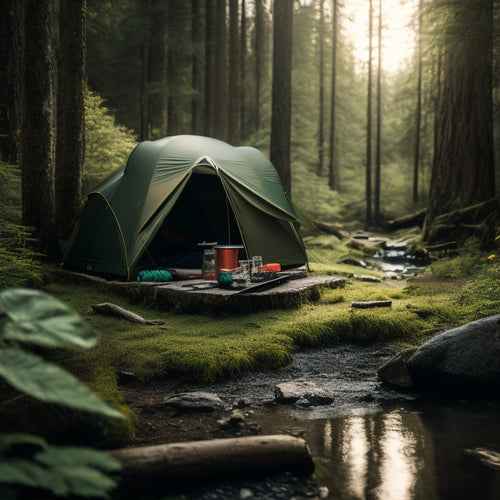
How Do You Generate Electricity for Your Off-Grid Cabin
Share
To generate electricity for your off-grid cabin, consider using solar panels, wind turbines, or micro-hydro systems. Solar panels convert sunlight into electricity, while wind turbines utilize natural wind energy. Micro-hydro systems provide a consistent energy supply if you have flowing water nearby. Integrate battery storage to manage energy availability, especially during low production periods. Prioritize energy-efficient appliances to optimize your consumption. Regular maintenance of these systems is crucial for performance and reliability. By exploring these options, you can create a sustainable energy solution that supports your lifestyle and minimizes your environmental impact. You can uncover more about these systems and their benefits.
At a Glance
- Install solar power systems with panels, inverters, and battery storage to harness sunlight for electricity generation.
- Utilize wind turbines, choosing between horizontal and vertical types, to capture wind energy effectively.
- Consider hydropower systems, particularly micro-hydro setups, for consistent and low-maintenance electricity from flowing water.
- Explore biomass energy solutions to recycle organic waste into electricity while reducing landfill impact.
- Assess energy needs through monitoring and prioritize essential appliances to optimize energy consumption and efficiency.
Cost-Effective Energy Solutions
When you're considering cost-effective energy solutions for your off-grid cabin, solar power systems and wind turbine options are top contenders.
Both methods utilize renewable resources to provide reliable electricity while minimizing long-term expenses.
Off-grid solar kits offer energy independence and can be customized to meet your specific energy needs.
Solar Power Systems
Solar power systems have emerged as reliable, cost-effective energy solutions for off-grid cabins, offering a sustainable way to employ the sun's energy. When considering your off-grid configurations, you'll want to focus on maximizing solar panel efficiency to guarantee you're capturing the most energy possible.
Here's a quick comparison of common solar power system components:
| Component | Description | Estimated Cost |
|---|---|---|
| Solar Panels | Convert sunlight into electricity | $200 - $400 each |
| Inverter | Converts DC to AC power | $1,000 - $3,000 |
| Battery Storage | Stores energy for later use | $500 - $2,500 |
Wind Turbine Options
Wind turbines represent a powerful alternative for generating electricity in off-grid cabins, utilizing the natural energy of the wind. When choosing between vertical and horizontal turbines, you'll need to evaluate turbine efficiency and the specific conditions at your site.
Horizontal turbines are generally more efficient, but vertical turbines can perform better in turbulent wind conditions and typically have lower noise levels.
Installation considerations are significant; confirm your chosen location has sufficient wind resources through a thorough site assessment. This involves measuring wind speeds to predict energy generation accurately.
Maintenance requirements vary, but both types should be inspected regularly to guarantee peak performance metrics.
If you're thinking about grid compatibility, most modern turbines can integrate with existing systems, allowing you to switch between off-grid and grid-connected energy as needed. Remember, though, that your wind turbine's performance can fluctuate based on environmental factors, so having a backup energy source is wise.
Ultimately, whether you choose vertical or horizontal turbines, both offer a sustainable solution that aligns with your desire for energy independence while embracing the natural elements around your off-grid cabin.
Sustainable Energy Source Advantages
When you choose sustainable energy sources for your off-grid cabin, you're greatly reducing your environmental footprint.
Not only do these options minimize harmful emissions, but they also provide cost-effective energy solutions that can save you money in the long run.
Battery storage systems, for instance, allow you to optimize your energy usage and achieve energy independence, ensuring a reliable power supply even during outages or low production periods.
Embracing renewable energy can enhance your cabin experience while promoting a healthier planet.
Environmental Impact Reduction
Utilizing sustainable energy sources for off-grid cabins not only enhances energy independence but also substantially reduces environmental impact. By utilizing solar, wind, or hydroelectric power, you can markedly lower your carbon footprint. These renewable sources generate electricity without the harmful emissions associated with fossil fuels, making your cabin a symbol of sustainability.
Energy conservation is another essential aspect of minimizing your environmental impact. When you adopt energy-efficient practices, like using LED lighting and energy-star appliances, you further decrease your energy needs. This collaboration between renewable energy and conservation creates a powerful structure for sustainable living.
Moreover, the decentralized nature of off-grid energy systems promotes a greater connection to nature, encouraging you to respect and preserve your surroundings. You're not just generating electricity; you're actively participating in a cycle of sustainability that supports ecological balance.
In essence, by choosing sustainable energy sources, you're taking a stand against environmental degradation. You're investing in a lifestyle that aligns with nature while enjoying the freedom and independence that off-grid living offers.
Seize this opportunity to create a positive impact on the planet, ensuring a cleaner, greener future for generations to come.
Cost-Effective Energy Solutions
In the domain of off-grid living, cost-effective energy solutions stand out as a notable advantage of sustainable energy sources. By employing options like biomass energy and hydroelectric power, you can greatly reduce your energy expenses while maintaining environmental integrity.
Here's a quick comparison of these energy solutions:
| Energy Source | Advantages |
|---|---|
| Biomass Energy | Makes use of waste materials, reducing landfill use; provides a renewable fuel source; often available locally. |
| Hydroelectric Power | Generates consistent energy; low operational costs; minimal environmental footprint if properly managed. |
Implementing these solutions can yield long-term savings and encourage energy independence. With biomass, you can convert agricultural or organic waste into energy, lessening your reliance on traditional fossil fuels. Hydroelectric systems make use of flowing water, making it a reliable energy source for your off-grid cabin.
Key Characteristics of Systems
When setting up an off-grid cabin, understanding the key characteristics of your energy system is essential.
You'll want to focus on renewable energy sources, such as solar and wind, that can reliably power your cabin.
Incorporating high round-trip efficiency energy storage solutions guarantees you have electricity available even when the sun isn't shining or the wind isn't blowing.
Additionally, selecting systems with smart charging features can enhance reliability during outages.
Renewable Energy Sources
Employing renewable energy sources for off-grid cabins offers an efficient and sustainable solution to power needs. By leveraging nature's resources, you can achieve energy independence while minimizing your environmental footprint.
Two prominent options are hydro power and biomass energy.
Hydro power systems generate electricity by converting the kinetic energy of flowing water into usable power. If you have a nearby stream or river, consider installing a micro-hydro system. This can provide a consistent energy supply, especially in areas with reliable water flow.
The setup typically requires a turbine, generator, and some piping, but once established, it can operate with minimal maintenance.
On the other hand, biomass energy makes use of organic materials, like wood or agricultural waste, to produce heat and electricity. You can set up a biomass generator to burn these materials, generating steam that drives a turbine.
This method is particularly advantageous if you have access to local biomass, allowing you to recycle waste while generating power.
Both hydro power and biomass energy provide a sustainable and versatile approach to meet your off-grid energy needs, ensuring you maintain your freedom in a self-sufficient lifestyle.
Energy Storage Solutions
Energy storage systems play an essential role in managing the intermittent nature of renewable energy sources in off-grid cabins. By utilizing advanced battery technology, you can store excess energy generated during sunny or windy days for use when conditions aren't ideal.
Lithium-ion batteries are popular for their high energy density and efficiency, allowing you to maximize your energy efficiency and minimize waste.
When selecting a storage solution, consider the capacity, discharge rate, and lifespan of the batteries. Larger capacity batteries enable you to store more energy, providing greater freedom during extended cloudy or calm periods.
Additionally, look for systems with integrated management features that optimize charging and discharging cycles, improving overall performance.
You might also investigate alternative technologies like lead-acid, flow, or even emerging solid-state batteries, each offering unique benefits and drawbacks.
Ultimately, the goal is to guarantee that your off-grid cabin remains powered efficiently and sustainably, providing you with the independence you desire.
Selecting Based on Energy Demand
To effectively generate electricity for your off-grid cabin, you first need to assess your energy needs.
Begin by evaluating your energy consumption patterns and taking stock of the appliances, lighting, and electronics you plan to use.
Start by prioritizing the essential appliances that will keep your cabin functional and comfortable.
This clear understanding of your energy demand will guide you in selecting the right system to meet those requirements, including possible energy-efficient appliances that can help reduce overall consumption.
Assessing Energy Needs
When deciding on a power system for your off-grid cabin, accurately evaluating your energy needs is crucial. Start by monitoring your energy consumption over a typical week. This will help you understand your usage patterns and identify how much power you truly require.
Consider every device you'll run, from lights and appliances to charging your devices and any heating or cooling systems. Document the wattage of each appliance, and note how many hours each one is used daily. This data allows you to calculate your total energy needs in kilowatt-hours (kWh).
Remember, it's not just about the total wattage; think about peak usage times as well. You don't want to invest in a system that can't handle your high-demand moments.
Once you have a clear depiction of your energy consumption, you can choose the right renewable energy sources, whether it's solar panels, wind turbines, or a combination. This customized approach guarantees you'll have a sustainable energy solution that aligns with your lifestyle, granting you the freedom to live off-grid without compromising your comfort.
Prioritizing Essential Appliances
Prioritizing essential appliances is key to optimizing your off-grid energy system. By selecting appliances based on their energy demand, you guarantee that your energy resources are used effectively and sustainably. Start by evaluating which appliances are vital for your daily needs and their energy efficiency ratings. This will guide your decisions in appliance management, allowing you to minimize energy consumption while maximizing comfort.
Here's a quick reference table to help you prioritize:
| Appliance | Average Wattage | Priority Level |
|---|---|---|
| LED Light Bulbs | 10-15 Watts | High |
| Refrigerator | 100-800 Watts | High |
| Laptop/Computer | 50-100 Watts | Medium |
| Hair Dryer | 800-1800 Watts | Low |
Focus on high-priority items first, especially those with lower wattage requirements. As you refine your energy strategy, consider investing in energy-efficient models and technologies. This way, you'll maintain freedom in your off-grid lifestyle without compromising on the essentials. Remember, smart appliance management not only enhances your energy independence but also contributes to a more sustainable living environment.
Lower Environmental Impact
When you choose renewable energy sources for your off-grid cabin, you greatly reduce your environmental footprint.
Options like solar panels, wind turbines, and micro-hydro systems utilize natural energy, minimizing reliance on fossil fuels.
This not only lowers greenhouse gas emissions but also promotes sustainable living practices in remote areas.
Renewable Energy Sources
Utilizing renewable energy sources is crucial for powering off-grid cabins while minimizing environmental impact. By tapping into the power of nature, you can achieve energy independence and reduce your carbon footprint.
Solar panels are a popular choice, converting sunlight into electricity efficiently. Pairing these with battery storage allows you to enjoy electricity even when the sun isn't shining.
Another effective option is geothermal heating. This method utilizes the Earth's consistent temperature, providing an efficient way to heat your cabin without relying on fossil fuels. It's a sustainable solution that can considerably lower your energy bills.
Hydroelectric systems can also be a fantastic choice if you have access to a flowing water source. By setting up a small-scale hydroelectric generator, you can capture kinetic energy from the water and convert it into usable electricity. This continuous power source guarantees you're never left in the dark.
Incorporating these renewable energy systems not only improves your freedom but also secures a sustainable future. Each of these options allows you to live comfortably and responsibly, maintaining a strong connection to the environment.
Accept the power of renewables and enjoy the freedom of off-grid living.
Frequently Asked Questions
What Types of Batteries Are Best for Off-Grid Electricity Storage?
For off-grid electricity storage, consider lithium batteries for their advantages in lifespan and charge cycles, especially compared to lead acid. They offer better solar compatibility and require less maintenance, ensuring your freedom from constant upkeep.
How Do I Maintain My Off-Grid Energy System?
Think of your energy system like a garden that needs regular care. Implement a maintenance schedule and perform system monitoring to guarantee everything runs smoothly. This keeps your off-grid paradise thriving and energy-efficient.
Can I Use a Generator as a Backup Power Source?
Yes, you can use a generator as a backup power source. Consider different generator types, like inverter or portable, and investigate fuel options such as gasoline, propane, or diesel for sustainable, reliable energy when needed.
What Should I Consider When Siting My Renewable Energy System?
When siting your renewable energy system, imagine utilizing the sun's fiery rays and wind's wild gusts. Consider solar orientation for maximum sunlight and wind exposure to capture every breath of nature's energy. Freedom awaits!
How Do I Calculate My Energy Needs for Off-Grid Living?
To calculate your energy needs, conduct a load assessment by monitoring your energy consumption. Identify daily usage of appliances, then sum the totals. This helps you choose the right renewable energy system for sustainable off-grid living.
Explore More
As you stand on your cabin's porch, watching the sun dip below the trees, remember that generating electricity off-grid isn't just about practicality—it's about harmony with nature. By choosing cost-effective, sustainable solutions, you're not only meeting your energy demands but also minimizing your environmental footprint. With the right system in place, your cabin becomes a guidepost of innovation, blending seamlessly into the scenery while utilizing the power of the wind, sun, or water around you.
Related Posts
-

Solid State Batteries in Electric Vehicles
Solid-state batteries revolutionize electric vehicles by offering a longer lifespan and higher energy density than tr...
-

Top 10 Off Grid Camping Gear Must-Haves
When you're off-grid camping, the right gear is crucial for a smooth expedition. Start with a durable, weather-resist...
-

Replacing Old Appliances With Sustainable Alternatives
Replacing old appliances with sustainable alternatives can change your home into an energy-efficient space. Not only ...


